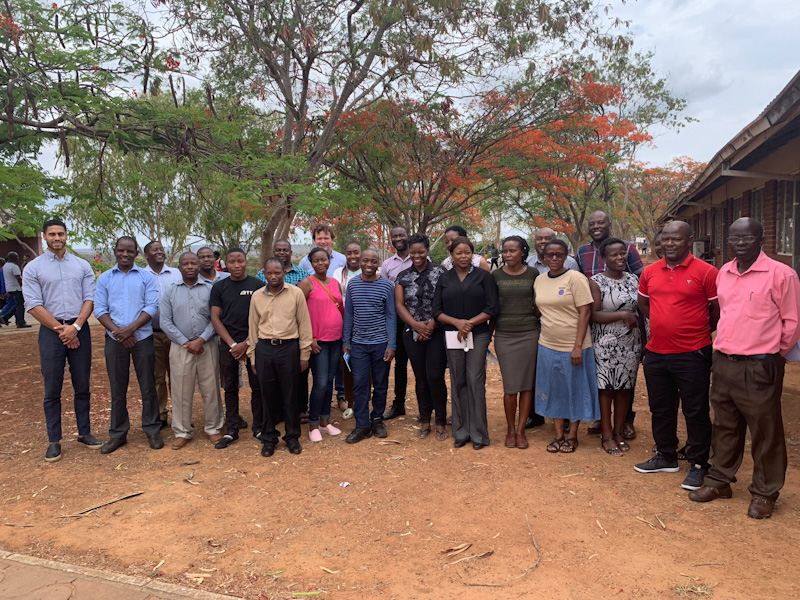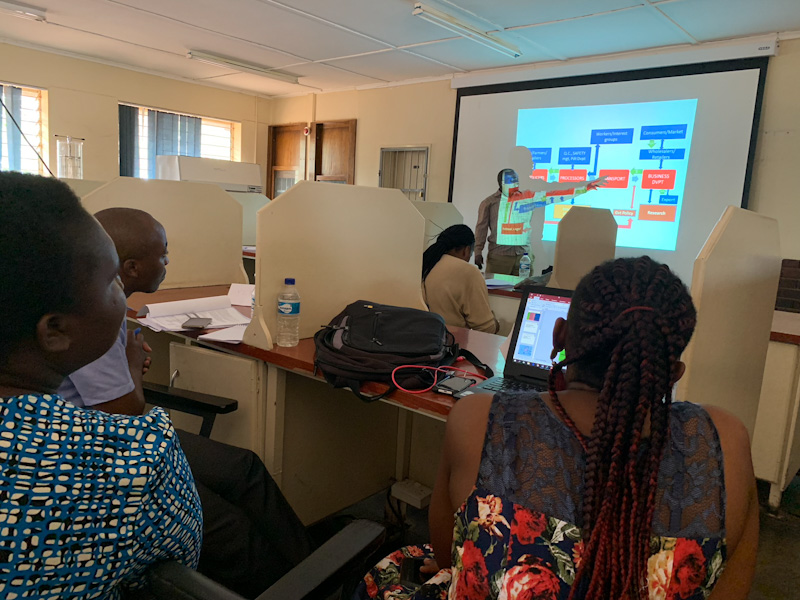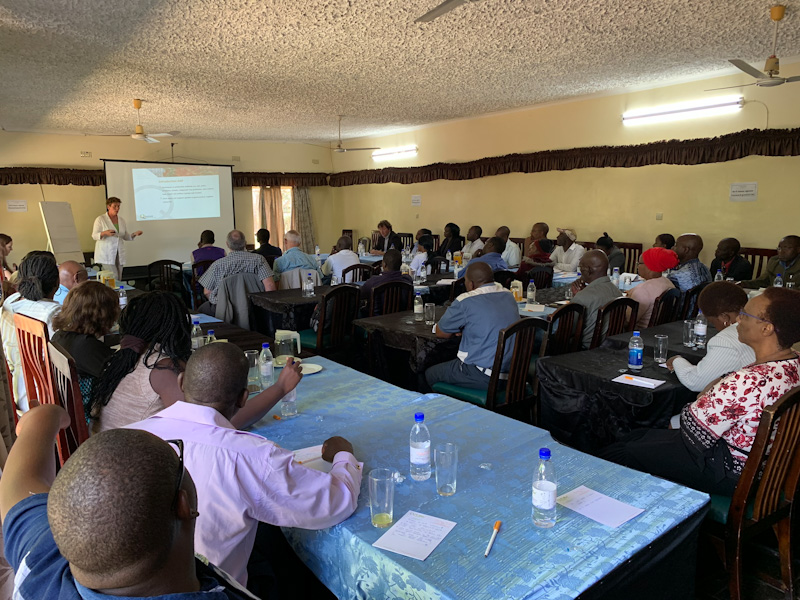We are happy to update you on the tailor-made training (OKP-TMT.18/00051) project at Chinhoyi University of Technology (CUT, click here for the website) in Zimbabwe, as part of the Orange Knowledge Programme (more info here), funded by the Dutch Ministry of Foreign Affairs and managed by Nuffic.

Group trainees with trainers Mark Bos and Boaz Liesdek
IMPROVE EDUCATIONAL PROGRAMMES
The aim of the training courses in the project ‘Developing gender-friendly and sustainable fresh produce value chains: building capacity in the Higher Education Institutions of Zimbabwe’ was to provide the trainees with knowledge, skills and tools to be applied in their teaching and research programmes. The lecturers of CUT were trained on a variety of topics related to the fruit and vegetable value chain in Zimbabwe.
VALUE CHAIN MANAGEMENT, QUALITY MANAGEMENT AND FOOD SAFETY
One of the training courses addressed the latest methodologies and practices for value-chain analysis incorporating strategies for sustainable impact and development in the field of international food and quality standards such as ISO 9001 and GLOBALG.A.P. The training used a practical approach on how to analyse the value chains of main agricultural perishable products in Zimbabwe. The participants selected 3 value chains for a case study: beans, citrus and passion fruit. Participants learned how to analyse market trends, gender dimensions, certification requirements and value chain development opportunities.

Groupwork presentation and discussion on value chain analysis
“The very first training period where we learned about scoping (defining one’s course in business) I learned to produce what the market wants rather than the market buying what is available.” – Ms Tsitsi Nyamupingidza
VALUE ADDITION AND POST-HARVEST MANAGEMENT
This training included topics such as product handling, information management, processing- and value addition techniques. The three groups continued to work on their value chain cases to learn strategies to recognise opportunities and how to come to market led innovations in post-harvest management, processing and value addition of perishable agricultural commodities. They learned to work with the Business Canvas Model and the Netchain Improvement Framework tools.
AGRO-ENTREPRENEURSHIP AND FEASIBLE ACTION PLANS
Together with Francis Hoogerwerf from Greenworks Consultancy, a training followed on entrepreneurial and marketing skills combined with a model for cost and revenue calculation, to further develop the three value addition business cases.
The training addressed enterprise skills and in particular how to take advantage of new or growing markets, calculation and management of the risks of changing patterns and methods of production, post-harvest handling and processing.
“Coming up with the value chain, business models and revenue streams. The teamwork was just great and highlighted the need for teamwork to come up with a viable business plan” – Ms Ruth Ngadze
STAKEHOLDER EVENTS DURING THE PROJECT
The ‘Zimbabwe Fruit & Vegetable Stakeholder Network Event’ was organised to connect over 50 stakeholders from the fruit and vegetable value chains, including farmers, processors, traders, advocacy organisations etc. The Embassy of the Kingdom of the Netherlands (EKN) in Harare participated in the event (more info on the event you will find here). This event was held in collaboration with Q-Point´s second Nuffic TMT project in Zimbabwe: ‘Capacity development in the field of GLOBALG.A.P. for fruit and vegetable farmers in Zimbabwe’.

Zimbabwe Fruit & Vegetable Stakeholder Network Event
Also, a stakeholder meeting was organised at the headquarters of SPAR Zimbabwe in Harare, with CUT trainees pitching their business plans to a group of 11 stakeholders, both public and private organisations. The discussions allowed the trainees to better understand the perspective of private sector players in the industry and to explore how CUT can contribute to private sector development.
CONTINUATION OF ENGAGEMENT IN DEVELOPING ZIMBABWE’S AGRICULTURAL SECTOR
The TMT project with Chinhoyi University as well as the Q-Point TMT on GLOBALG.A.P. with Sisonke Ag Fresh, show both the enormous potential and the existing gaps for the Zimbabwean agricultural sector to overcome, to regain the position of leading food producer in Africa.
A new activity in Zimbabwe is the Horticulture Centre of Expertise (HcoE). HcoE is a Dutch private sector initiative to develop a so-called Horticulture Centre of Excellence, or demonstration and training centre, in Zimbabwe together with local partners. Another example is the ongoing activity of PUM in collaboration with ZimTrade. PUM provides entrepreneurs with advice for the sustainable development of their business. The organisation links experts to entrepreneurs to provide advice on location, training, business incubation and links with the Dutch private sector.




